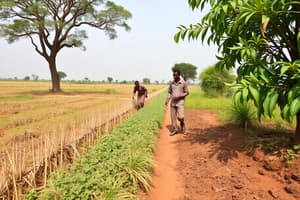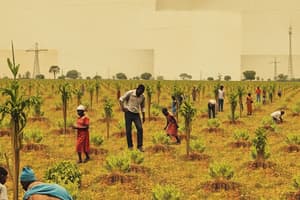Podcast
Questions and Answers
What is the significance of agriculture in the Nigerian economy?
What is the significance of agriculture in the Nigerian economy?
- It is only practiced in the northern region
- It is mainly practiced for subsistence purposes
- It contributes a significant proportion to the GDP (correct)
- It provides employment for a small percentage of the population
Agriculture in Nigeria is primarily mechanized.
Agriculture in Nigeria is primarily mechanized.
False (B)
What is the main challenge facing agriculture in Nigeria?
What is the main challenge facing agriculture in Nigeria?
Inadequate infrastructure and limited access to credit
Nigeria's agricultural sector is characterized by a high degree of ___________ farming.
Nigeria's agricultural sector is characterized by a high degree of ___________ farming.
Match the following agricultural practices with their descriptions:
Match the following agricultural practices with their descriptions:
What was the total mid-year population estimate in 2019?
What was the total mid-year population estimate in 2019?
The population of the Western Cape grew by 13.7% between 2013 and 2019.
The population of the Western Cape grew by 13.7% between 2013 and 2019.
What is the CAGR of the North West province's population?
What is the CAGR of the North West province's population?
The province with the highest population in 2019 was __________________.
The province with the highest population in 2019 was __________________.
Which province had the lowest population growth rate between 2013 and 2019?
Which province had the lowest population growth rate between 2013 and 2019?
The population of KwaZulu-Natal decreased between 2016 and 2017.
The population of KwaZulu-Natal decreased between 2016 and 2017.
Match the following provinces with their population growth rates between 2013 and 2019:
Match the following provinces with their population growth rates between 2013 and 2019:
Why is age distribution important?
Why is age distribution important?
What do backward linkages measure?
What do backward linkages measure?
An increase in final demand for agricultural products stimulates other domestic sectors to satisfy the agricultural sector's intermediate input requirements
An increase in final demand for agricultural products stimulates other domestic sectors to satisfy the agricultural sector's intermediate input requirements
What are the three aspects of value added that impact GDP?
What are the three aspects of value added that impact GDP?
An increase of one rand in the production by the agriculture sector will result in an R____________ increase in the GDP of the country
An increase of one rand in the production by the agriculture sector will result in an R____________ increase in the GDP of the country
What is the GDP multiplier for agriculture?
What is the GDP multiplier for agriculture?
The induced effect refers to the increase in value of output from all sectors as a result of a price increase in the cost of value added
The induced effect refers to the increase in value of output from all sectors as a result of a price increase in the cost of value added
Match the following concepts with their descriptions
Match the following concepts with their descriptions
What is the impact of an increase of one rand in the production by the agriculture sector on the country's GDP?
What is the impact of an increase of one rand in the production by the agriculture sector on the country's GDP?
What is the role of 'Business advice, Training, Trade Promotion' in the national value chain?
What is the role of 'Business advice, Training, Trade Promotion' in the national value chain?
Input suppliers provide business management advice in the national value chain.
Input suppliers provide business management advice in the national value chain.
What is the role of 'Trade Facilitation' in the export market value chain?
What is the role of 'Trade Facilitation' in the export market value chain?
The national value chain involves ___________ and training.
The national value chain involves ___________ and training.
Match the following value chain players with their roles:
Match the following value chain players with their roles:
What is the role of 'Quality management advice/certification' in the export market value chain?
What is the role of 'Quality management advice/certification' in the export market value chain?
The national value chain involves input suppliers providing business management advice.
The national value chain involves input suppliers providing business management advice.
What is the role of 'Business Development Services (BDS)' in the national value chain?
What is the role of 'Business Development Services (BDS)' in the national value chain?
Which of the following skills are critical in farming?
Which of the following skills are critical in farming?
Farming is traditionally focused on commodities.
Farming is traditionally focused on commodities.
What drives the business in modern farming?
What drives the business in modern farming?
Modern farming requires ______________________ skills.
Modern farming requires ______________________ skills.
Match the following farming characteristics with their descriptions:
Match the following farming characteristics with their descriptions:
What kind of markets are characteristic of modern farming?
What kind of markets are characteristic of modern farming?
What is the general rule of thumb for assets in the agricultural sector?
What is the general rule of thumb for assets in the agricultural sector?
The rule of thumb for assets in the agricultural sector is the same for all industries.
The rule of thumb for assets in the agricultural sector is the same for all industries.
What is the rule of thumb for assets in extensive livestock farming?
What is the rule of thumb for assets in extensive livestock farming?
In intensive farming (chickens), the rule of thumb is approximately ______________.
In intensive farming (chickens), the rule of thumb is approximately ______________.
What is the source of the data on net farm income and total debt?
What is the source of the data on net farm income and total debt?
The graphs show a decreasing trend in maize and wheat production.
The graphs show a decreasing trend in maize and wheat production.
What is the 'New Agriculture' concept?
What is the 'New Agriculture' concept?
The 'New Agriculture' concept is characterized by a shift from ______________ farming to a modern approach.
The 'New Agriculture' concept is characterized by a shift from ______________ farming to a modern approach.
Match the following agricultural practices with their characteristics:
Match the following agricultural practices with their characteristics:
What is the general approach to farming in the 'New Agriculture' concept?
What is the general approach to farming in the 'New Agriculture' concept?
Flashcards are hidden until you start studying
Study Notes
Agriculture in Nigeria's Economy
- Agriculture plays a vital role in Nigeria's economy, indicating its significant contribution to the country's economic development.
Characteristics of Agriculture in Nigeria
- Agriculture in Nigeria is not primarily mechanized, suggesting that most farming practices are still manual or semi-mechanized.
Challenges Facing Agriculture in Nigeria
- The main challenge facing agriculture in Nigeria remains unspecified, but it could be related to factors such as limited mechanization, inadequate infrastructure, or insufficient funding.
Farming Practices in Nigeria
- Nigeria's agricultural sector is characterized by a high degree of subsistence farming, where farmers focus on producing food for their local communities rather than for commercial purposes.
Population Estimates by Province
- Mid-year population estimates by province from 2013 to 2019:
- Western Cape: 6,017 (2013) to 6,844 (2019), with a growth rate of 13.7% and CAGR of 2.2%
- Eastern Cape: 6,620 (2013) to 6,712 (2019), with a growth rate of 1.4% and CAGR of 0.2%
- Northern Cape: 1,163 (2013) to 1,263 (2019), with a growth rate of 8.6% and CAGR of 1.4%
- Free State: 2,753 (2013) to 2,887 (2019), with a growth rate of 4.9% and CAGR of 0.8%
- KwaZulu-Natal: 10,457 (2013) to 11,289 (2019), with a growth rate of 8.0% and CAGR of 1.3%
- North West: 3,598 (2013) to 4,027 (2019), with a growth rate of 11.9% and CAGR of 1.9%
- Gauteng: 12,728 (2013) to 15,176 (2019), with a growth rate of 19.2% and CAGR of 3.0%
- Mpumalanga: 4,128 (2013) to 4,592 (2019), with a growth rate of 11.2% and CAGR of 1.8%
- Limpopo: 5,518 (2013) to 5,983 (2019), with a growth rate of 8.4% and CAGR of 1.4%
- Total: 52,982 (2013) to 58,775 (2019), with a growth rate of 10.9% and CAGR of 1.7%
Value Chain Players, Supporters, and Influencers
- National value chain:
- Business advice
- Training
- Trade promotion
- Trade facilitation
- Importers/processors
- Quality management advice/certification
- Input suppliers:
- Seed
- Equipment
- Pesticides
- Indirect effects:
- Backward linkages: measure one sector's dependence on inputs from other sectors
- Forward linkages: increase in value of output from all sectors as a result of price increase in the cost of value added
- Induced effect: chain reaction triggered by salaries and profits ploughed back into the economy
Economic Multiplier Effects
- Multiplier effects manifest in different ways:
- Contribution to GDP: impact on GDP reflects the magnitude of the annual value added to the South African economy
- Value added consists of:
- Remuneration of employees
- Gross operating surplus
- Net indirect taxes
- GDP multiplier for agriculture: 1.51
- Rule of thumb: 0.5 (assets are worth 3 times more than liabilities)
Net Farm Income and Total Debt
- Net farm income and total debt (real terms 2010 = 100)
- Source: Abstract for Agricultural Statistics, 2020
Maize and Wheat Trends
- Maize trends:
- Source: Abstract for Agricultural Statistics, 2020
- Wheat trends:
- Source: Abstract for Agricultural Statistics, 2020
The Meat Sector
- The meat sector:
- No specific information provided
The "New Agriculture"
- Old concept vs. new concept:
- Farming as an art vs. farming as science-based
- Technical skills vs. human/personal skills
- Stability vs. change/chaos/flexibility
- Tradition vs. new ideas
- Commodities vs. differentiated raw material
- Assets drive the business vs. customer drives the business
- Core skills vs. new/unique/different skills
- Independence vs. interdependence
- Impersonal/sourcing/open markets vs. personal/negotiated markets
Studying That Suits You
Use AI to generate personalized quizzes and flashcards to suit your learning preferences.




